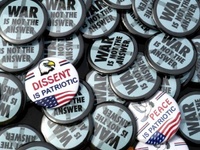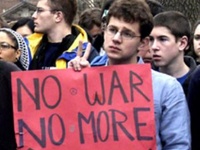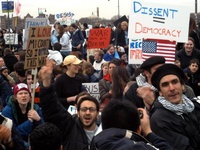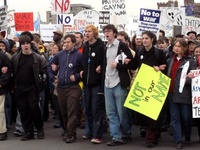“We think that the University should not be the beneficiary of a war not approved by the United Nations, protested by a large portion of the world’s population, and opposed by the governments of many countries traditionally allied to the U.S.,” it read.
The divestment push was deflated when Summers told the Faculty that the University would not take a stance on political issues.
“The University administration is conservative,” Mendelsohn says. “It is the Faculty’s job to push them along and that is what [we] did.”
Futile Tactics?
The Faculty rallied around its academic self-interest, but students lacked a unifying theme for their protests and had no direct interest in the war.
“There was more a concrete link between sitting in Mass. Hall until [the president] made a decision than there was with the war with Iraq,” Hamad says.
The faculty members, by contrast, were in agreement with each other, but found their influence limited.
Ultimately, students also began to question the effectiveness of their focus on big rallies over strong positions.
“Our protests were just the familiar crowd preaching to the choir,” Buttigieg says. “The faculty were in lead.”
But even faculty members question their own commitment to the anti-war effort.
“We were active, but we were not as active as we could have been,” Harris says.
Citing sacrifices he could have made, Harris says he found his engagement with the anti-war movement at times “depressing.”
But others cite deeper reasons for the movement’s frustration.
“There was no coalition building,” McCarthy says. “And that starved the efforts to mobilize.”
—Staff writer Jessica E. Vascellaro can be reached at vascell@fas.harvard.edu.













